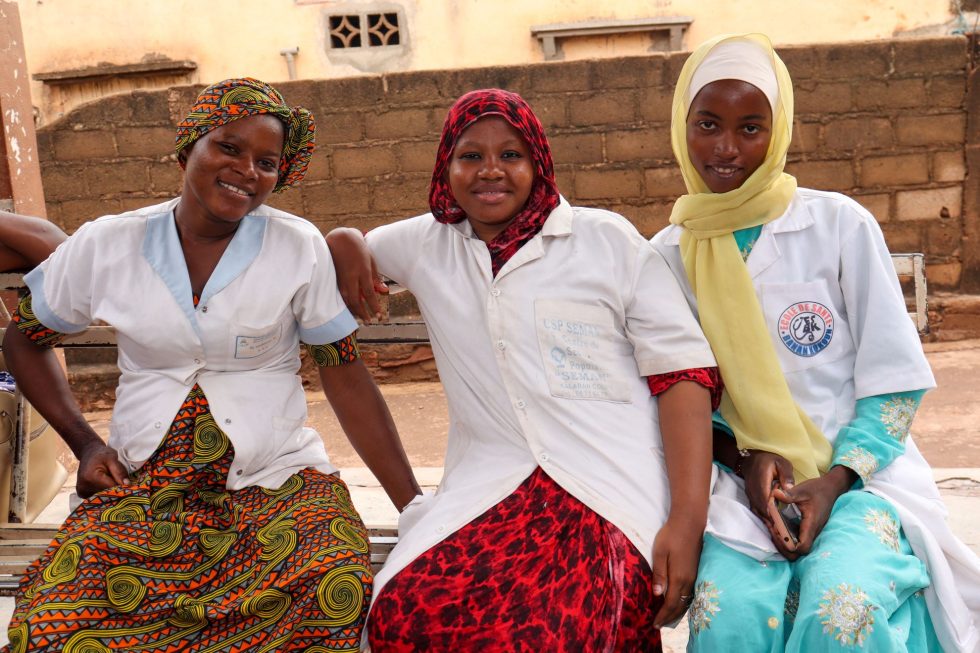Prevent maternal and child deaths by improving local healthcare and women’s financial status
Lesson Learned:
Improving people’s financial status allows them to access lifesaving healthcare, improving health outcomes.
Mali faces one of the highest maternal mortality ratios globally at 325 deaths per 100,000 live births. The under-5 mortality rate is also alarmingly high, with nearly 94 out of 1,000 children dying before their 5th birthday.[1]
By increasing access to healthcare services, health education, and financial stability, the Mali Health Organizing Project reduces preventable deaths and improves the health and life prospects of mothers and their children.
“Before today, I never knew about cervical cancer, but after speaking with the midwives and community health workers, I understand the importance of being screened for this disease. I will strongly encourage my friends, neighbors, and colleagues to visit a health center every year to get screened.”
— Mme. Outtara, community member

What it does
Founded in 2006, the Mali Health Organizing Project (Mali Health) improves the health and finances of women and their children in peri-urban communities, areas immediately adjacent to cities, through four activities: deploying community health workers, creating savings groups and business cooperatives for women, hosting community events, and improving the quality of care provided by community health centers.
Unlike in Mali’s rural areas, peri-urban communities do not have community health workers (CHWs) as part of their government-run health systems. Mali Health provides training and pay to existing volunteer workers and trains new workers to serve these communities. CHWs visit families to monitor health, ensure completion of routine primary care, provide preventive health information, and refer patients to health centers.
Mali Health helps women overcome financial barriers to healthcare by organizing savings groups and supporting women’s business cooperatives. Savings groups are comprised of 15 – 20 members who contribute weekly and allow members to borrow from the shared pool of funds to pay for healthcare expenses or small income-generating activities. The average weekly contribution is around 100 to 200 FCFA, about 25 cents USD, collectively accumulating to about $227 annually.
Starting in 2018, Mali Health began supporting women in creating cooperatives that produce and sell health-promoting products, like soap and peanut butter. Thus far, Mali Health has supported 549 women in forming 13 cooperatives. The organization also conducts annual health fairs, offering free health consultations and screening families for eligibility for services.
Finally, to improve the quality of healthcare wherever patients receive it, Mali Health works with community health centers using data and feedback collected from patients, primarily mothers, to improve the clinical quality of healthcare delivery, patient experience, and center management.
How effective it is
Mali Health has had zero maternal and child deaths among the families their CHWs serve over the past 10 years, compared to the country’s maternal mortality rate of 325 deaths per 100,000 live births a year and under-five mortality rate of 94 deaths per 1,000 children.[2]
100% of mothers receiving care from Mali Health attend all prenatal and postnatal care visits and 100% give birth at health centers rather than at home, ensuring that they receive adequate care.
Additionally, 100% of the children enrolled in community health programs receive vaccinations on time, five times the national average. Diarrheal disease incidence was 0.56% in the program in 2023, while the national rate was 17%.[3]
The cooperative program has raised participants’ income from an average of $18 a month prior to participation to $51 a month after one year, $65 after two years, $95 a month after three years, and $131 a month after five years. As a result of the organization’s savings programs, 94% of women have funds to pay for healthcare when needed.
The total 2023 cost of the community health worker program was only $116,200. This provided healthcare to 1,795 children and pregnant women and resulted in 54,596 CHW home visits.
How philanthropy helps
Philanthropy covers 87% of The Mali Health Organizing Project costs, with the rest from government partnerships. More philanthropic support will enable Mali Health to expand its programs to more women and their families in Mali. Learn more: https://malihealth.org/
More ways to help
Healthy Learners trains teachers as community health workers to screen, counsel, and provide basic care for the children in their schools. Lwala Community Alliance uses a community health model to improve child and maternal health outcomes in Lwala, Kenya. VillageReach supports community health workers in sub-Saharan Africa with essential communication and supply chain logistics.
For more on community-based health initiatives, see our Community-Based Approaches to Health guidance.
Notes
[1] UNICEF. (2022). Mali (MLI)—Demographics, Health & Infant Mortality. UNICEF DATA. https://data.unicef.org/country/mli/
[2] UNICEF. (2022). Mali (MLI)—Demographics, Health & Infant Mortality. UNICEF DATA. https://data.unicef.org/country/mli/
[3] United States Agency for International Development. (2024). Mali Demographic and Health Survey 2023–2024—Key Indicators Report (French) [Preliminary Reports/Key Indicators Reports]. The Demographic and Health Surveys Program. https://dhsprogram.com/publications/publication-PR158-Preliminary-Reports-Key-Indicators-Reports.cfm
